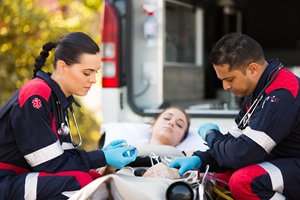First responders handle emergency situations nearly every day on the job. These high-stress events can make it difficult for servicemembers to remain calm and take care of the problem efficiently and in a timely manner. The ability to assess the situation and come up with the best course of action in a life-threatening circumstance is a skill that takes a great deal of training and is crucial to protecting the community.
It is a good idea to keep your training in the back of your mind at all times to ensure that you know what to do in emergency situations. Here are a few tips to remember while on the job so that you can keep yourself and emergency victims safe.
Never be afraid to ask for help
First responders should never hesitate to request backup if they cannot handle the situation on their own. Servicemembers who are new to the job should not be afraid to ask for assistance if something comes up that they do not know how to handle.
Even experienced first responders are bound to run into a situation that they have yet to encounter. Calling for backup will increase the chances that the citizens involved in the emergency will end up safe and a solution will be found.
Stay calm while helping children
Most first responders have experienced an emergency situation in which they have to assist young children. Although it is always essential to stay calm and focused during your daily encounters, when they involve young victims, this is particularly important. Children will follow your lead – if you are panicking, they will follow suit.
Displaying confidence, even if it may be lacking, will help children feel that their safety is ensured. Being patient, speaking in a friendly voice and allowing them more time to process and respond to what you are saying will also increase the likelihood that the situation will work out smoothly.
Know how to help those with mental disabilities
According to the Indiana Protection and Advocacy Services, assisting someone with mental disabilities requires different procedures compared to helping healthy individuals. When aiding those with mental disabilities, clear and simple communication is key. Allow them plenty of space so that they do not feel overwhelmed or cornered, especially if they are already flustered as a result of an injury or traumatic experience.
Finding a quiet space away from the commotion and groups of people will allow mentally disabled citizens to relax and process what you are trying to tell them. Ask them or any caregivers that may be present if they are taking any medications. If so, remember to take the medicine with you as you leave the site.
Be prepared for assisting people with physical disabilities
Physical impairments, such as blindness or deafness, also demand certain strategies when handling an emergency situation. For example, when assisting those who are deaf, switching the lights on and off if possible to get their attention will ensure that you do not alarm them. Maintaining steady eye contact and using clear hand gestures will significantly enhance your ability to communicate. While helping those experiencing visual impairments, announce your presence and offer assistance before you try to guide them to safety.
Before helping people with mobility issues, ask them what the best way to assist them is, whether you are lifting them into a wheelchair or need to carry them out of the building. They may have special techniques that can get the job done faster, which is particularly important if there is a fire or they require immediate medical assistance. Try not to interfere with their movements until they give you their permission, unless the nature of the emergency demands immediate action.

